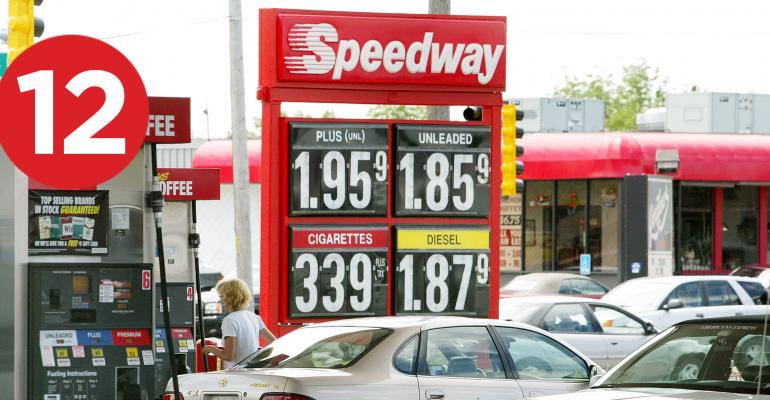- 7-Eleven to Buy Marathon Petroleum’s Speedway Stores for $21B “In what is one of the biggest global acquisitions to be announced this year, Marathon Petroleum Corp. has agreed to sell its chain of Speedway convenience stores and gas stations to 7-Eleven for $21 billion in cash. The transaction is expected to close in the first quarter of 2021, subject to customary closing conditions and regulatory approvals. The deal includes about 3,900 convenience stores.” (GlobeSt.com)
- Lord & Taylor, Oldest U.S. Department Store, Files For Bankruptcy “Lord & Taylor, the oldest U.S. department store chain, has joined the cascade of retailers tumbling into bankruptcy during the coronavirus pandemic. Sunday's filing comes less than a year after Lord & Taylor was acquired by an online clothing-rental startup called Le Tote.” (NPR)
- Litigation, vacant spaces: How COVID-19 is shifting commercial real estate “This example is one of many ways the COVID-19 pandemic and ongoing concerns about the virus spreading are causing key shifts in the commercial real estate market, driven by remote working and a decline in business activity. The pandemic-led closures also are leading to new litigation over unpaid rent and raising questions about the future uses of space, all while landlords and tenants seek recourse.” (MIBiz.com)
- A Virtual Certainty: How the Pandemic Hastened Tech Adoption in the Multifamily Space “In many important ways the multifamily real estate sector, in its zeal to provide its residents with the best possible amenities, anticipated the coronavirus pandemic. Such things as virtual tours, smart technology and online payments made social distancing possible before it became a necessity. Yet it’s only a start. It is expected that as the pandemic wears on, tech’s impact will be felt even more in this space -- potentially in areas like contact tracing, though that carries with it privacy and security concerns -- and that when this health crisis subsides, the innovation boom will continue unabated.” (Realty Times)
- Retail rents plummet across New York City, as America’s glitzy shopping districts turn into ghost towns “As the coronavirus pandemic brings tourism to a temporary standstill, leaves consumers holed up at home and puts millions out of work, America’s glitziest and most expensive retail districts are losing tenants, and rents are in a free fall. The pressures from the Covid-19 crisis will likely have a lasting impact on shopping streets such as Michigan Avenue — better-known as the ‘Magnificent Mile’ — in Chicago, the Las Vegas Strip, and Rodeo Drive in Los Angeles, to name a few.” (CNBC)
- Dunkin’ Is Trimming Its Footprint. Should Landlords Worry? “The 800 locations on the chopping block include 450 limited-menu, self-serve kiosk locations housed within the Speedway convenience store and gas station chain. From an ownership standpoint, closing these assets shouldn’t affect the income or value of the property, noted Jimmy Goodman, partner at The Boulder Group, the Chicago-based net lease advisory firm.” (Commercial Property Executive)
- Broward’s retail market remains relatively unscathed. That is expected to change “Since the first quarter, average occupancy rates have dropped by 0.3% for outdoor shopping centers with over 20,000 square feet, according to a July retail report published by 11th St. Capital. The report by the Boca Raton-based real estate investment and management firm found that total occupancy at the 600 outdoor shopping centers in Broward dipped from 89.1% in the first quarter 2020 to 88.8% in July 2020.” (Miami Herald)
- One-Third of New York’s Small Businesses May Be Gone Forever “More than 2,800 businesses in New York City have permanently closed since March 1, according to data from Yelp, the business listing and review site, a higher number than in any other large American city. About half the closings have been in Manhattan, where office buildings have been hollowed out, its wealthier residents have left for second homes and tourists have stayed away.” (The New York Times)
- Mall Operators As Retailers: Will REITailing Work? “Of course the benefits to them are obvious. They get to keep these stores as tenants, paying rent — to themselves it should be noted — rather than accumulating more vacant storefronts in their properties. In the case of anchors like Penney, they prevent smaller tenants from canceling their leases due to provisions based on occupancy factors. And they seemingly show their support and long-term belief for the business of physical retailing.” (Forbes)
- Dalian Wanda Sells Chicago Project for $270M to Close Out Global Portfolio “Dalian Wanda Group last week announced that it had agreed to sell its 90 percent stake in a Chicago property project for $270 million, closing out the last of an overseas property portfolio that once included projects in the US, UK, France, Spain and Australia.” (Mingtiandi)
- A Better Year for Trump’s Family Business (Last Year, That Is) “As the United States economy was humming in 2019, the Trump Organization reported revenues of at least $446.3 million, up more than 2 percent from $434.9 million, in 2018. In 2017, he reported at least $452.6 million in revenues. All told, the report shows that last year’s revenues, while an improvement over 2018, still reflect the toll Mr. Trump’s divisive presidency has taken on his brand.” (The New York Times)
- Only 37% of Hotels Have Brought Back Half of Their Employees “Only 37% of hotels have brought back half of their employees according to a survey by the American Hotel & Lodging Association (AHLA). Furthermore, 9 in 10 hotels have been forced to either lay off or furlough their employees due to COVID-19. Businesses in the events and leisure sectors were hit the hardest as the pandemic unfolded. Since mid-February across the nation hotels have already lost more than $40 billion in room revenue. As of July 8, nearly 6 out of 10 hotel rooms were empty across the country.” (Small Business Trends)
0 comments
Hide comments





